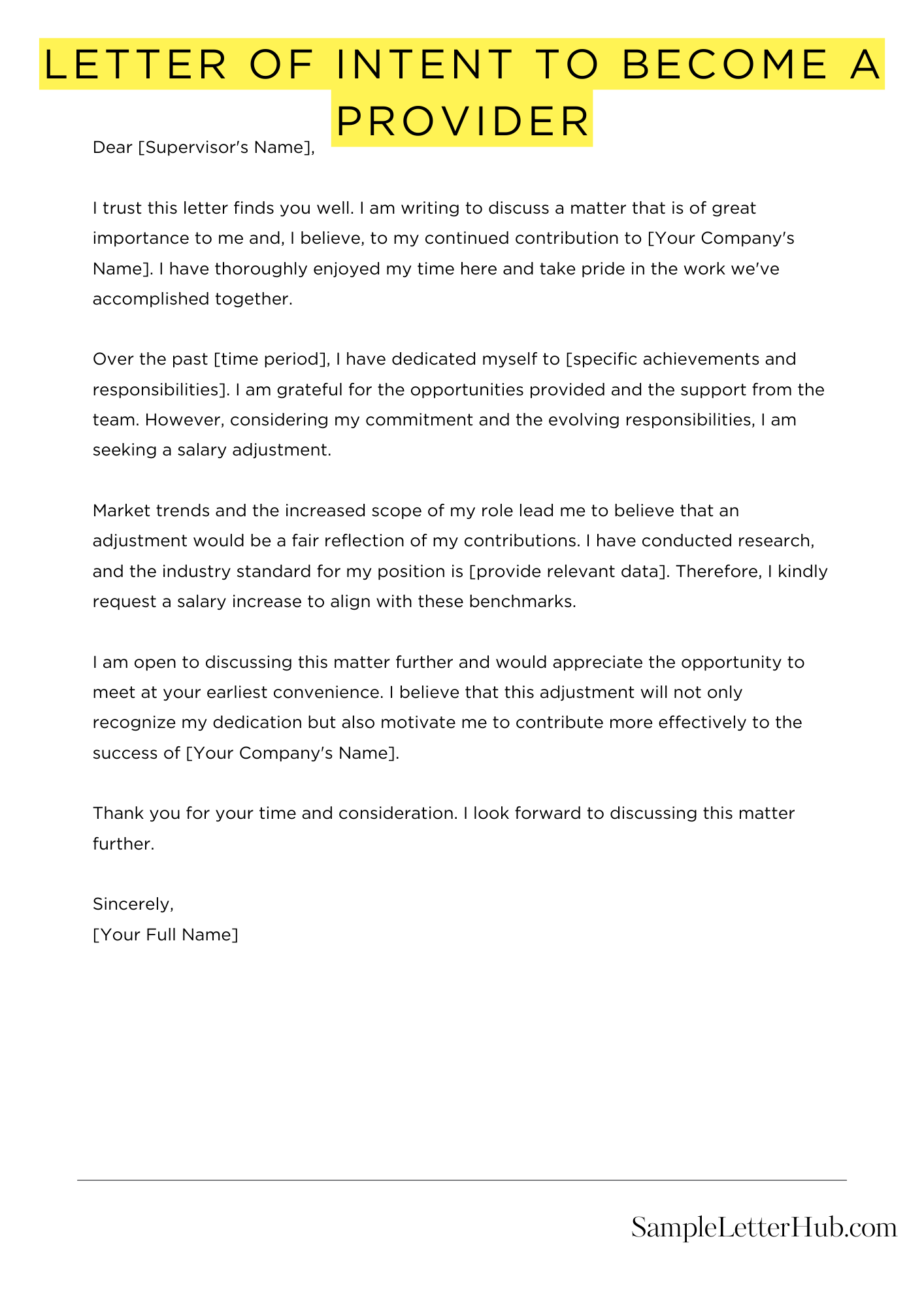A Letter of Intent to Become a Provider is a document that outlines your interest in becoming a provider for a specific organization. It is typically used to express your qualifications and experience, and to demonstrate your commitment to providing high-quality services.
In this article, we will provide you with several templates, examples, and samples of Letters of Intent to Become a Provider. These resources will help you to create a well-written and effective letter that will increase your chances of being selected as a provider.
Please note that these templates are for informational purposes only and should be customized to fit your specific needs and circumstances.
Letter of Intent to Become a Provider
Dear [Recipient Name],
I am writing to express my interest in becoming a provider for [Organization Name]. I have been in the [industry] industry for [number] years and have a proven track record of success.
I am confident that I can provide [Organization Name] with the high-quality products and services that you require. I am also committed to providing excellent customer service and building a long-term relationship with your organization.
I have attached my resume for your review. I would welcome the opportunity to discuss my qualifications further and provide you with any additional information you may need.
Thank you for your time and consideration.
Sincerely,
[Your Name]

How to Write a Letter of Intent to Become a Provider
A letter of intent to become a provider is a formal document that expresses your interest in providing goods or services to a specific organization or entity.
1. Introduction
Begin your letter with a formal salutation, such as “Dear [Recipient Name]”. Clearly state your purpose for writing, which is to express your interest in becoming a provider.
2. Company Overview
Provide a brief overview of your company, including its name, location, and core competencies. Highlight any relevant experience or qualifications that make you a suitable provider.
3. Services or Products Offered
Describe the specific services or products that you intend to provide. Be clear and concise, outlining the benefits and value that your offerings bring to the organization.
4. Capabilities and Expertise
Demonstrate your capabilities and expertise by providing specific examples of successful projects or initiatives that showcase your skills and knowledge in the relevant field.
5. Competitive Advantages
Identify any competitive advantages that your company possesses, such as unique technology, specialized expertise, or cost-effective solutions. Explain how these advantages differentiate you from other potential providers.
6. Call to Action
Conclude your letter by expressing your eagerness to discuss your proposal further. Request a meeting or follow-up communication to explore the possibility of establishing a provider relationship.
7. Closing
End your letter with a formal closing, such as “Sincerely” or “Respectfully”, followed by your signature and printed name.
FAQs about Letter Of Intent To Become A Provider
What is a Letter of Intent (LOI)?
A Letter of Intent (LOI) is a non-binding document that expresses a party’s interest in entering into a formal agreement with another party. In the context of healthcare, an LOI is often used to indicate a provider’s interest in becoming a member of a health plan’s network.
What are the key elements of an LOI?
An LOI typically includes the following elements:
- The names of the parties involved
- A statement of the intent to enter into a formal agreement
- A brief description of the proposed agreement
- A timeline for the negotiation and execution of the formal agreement
- Signatures of the authorized representatives of both parties
What is the purpose of an LOI?
An LOI serves several purposes, including:
- Demonstrating the parties’ commitment to entering into a formal agreement
- Establishing a framework for the negotiation of the formal agreement
- Protecting the parties’ interests in the event that the formal agreement is not executed
What are the benefits of using an LOI?
There are several benefits to using an LOI, including:
- It can help to expedite the negotiation process
- It can help to avoid misunderstandings and disputes
- It can help to protect the parties’ interests
What are the risks of using an LOI?
There are also some risks associated with using an LOI, including:
- It may create a binding obligation if it is not carefully drafted
- It may be difficult to enforce if the parties do not reach a formal agreement

